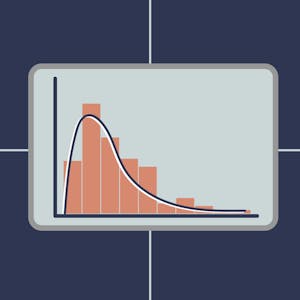This comprehensive course delves into advanced Bayesian statistical models and computational techniques to effectively analyze real-world data. Through a combination of lectures, computer demonstrations, readings, and exercises, students will expand their Bayesian toolbox with more general models and learn computational techniques to fit them.
Participants will learn to construct, fit, assess, and compare Bayesian statistical models to answer scientific questions involving continuous, binary, and count data. The course will also introduce Markov chain Monte Carlo (MCMC) methods, offering practical walkthroughs and an active learning experience. Upon completion, learners will have access to a wide range of Bayesian analytical tools customizable to their data.
Certificate Available ✔
Get Started / More Info
Bayesian Statistics: Techniques and Models comprises five modules that cover statistical modeling and Monte Carlo estimation, Markov chain Monte Carlo (MCMC), common statistical models, count data and hierarchical modeling, and a capstone project. The course provides an in-depth understanding of advanced Bayesian statistical models and computational techniques.
This module provides an introduction to statistical modeling and Monte Carlo estimation. It covers the modeling process, components of Bayesian models, non-conjugate models, Monte Carlo integration, Markov chains, and the statistical modeling process. Learners will gain insights into efficient communication of data analysis results and statistical modeling techniques.
The Markov chain Monte Carlo (MCMC) module delves into the algorithm, random walk examples, model writing, running, and post-processing, trace plots, autocorrelation, and alternative MCMC software. Participants will gain practical knowledge of MCMC methods and their application in statistical modeling and analysis.
This module introduces common statistical models, including linear regression, ANOVA, and logistic regression. It covers model setup in R, JAGS model development, model checking, DIC, and prediction. Learners will understand the application of these models in analyzing scientific questions involving various types of data.
The count data and hierarchical modeling module explores Poisson regression, predictive distributions, correlated data, prior predictive simulation, hierarchical modeling, and mixture models. Participants will learn to select prior distributions and apply hierarchical modeling to analyze complex data.
The capstone project module concludes the course with a comprehensive data analysis project that allows learners to apply the knowledge and skills acquired throughout the course. Participants will engage in a hands-on project to further reinforce their understanding of Bayesian statistical models and computational techniques.
This course equips learners with the skills to plan, design, and analyze experiments effectively, using modern experimental strategies and data analysis techniques....
Inferential Statistics offers a comprehensive exploration of statistical inference methods for both numerical and categorical data, emphasizing practical applications...
Measurement Systems Analysis provides comprehensive training on analyzing measurement systems for process stability and capability using R software.
Wrangling Data for Data Analysts with Python